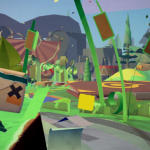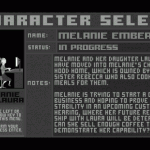Each week in Play in Process, Richard Clark shares what he’s been playing and why it matters.
I’ve been playing an exploratory platform game called Outland, primarily a game about following a path from one place to another, with occasional detours and avoiding obstacles along the way. Every aspect of the game feels really good to pull off. Platforming, combat and using various acquired skills all seem to flow seamlessly from one to the other.
Then there’s the story element: it seems to be a strange potpourri of new age religious elements, most notably the assertion of a “light” and “dark” force that are both, according to the game, good and necessary in the world. This truth informs the gameplay as well, inspiring one of the most enjoyable play mechanics in the game: the ability to change colors in order to interact with various aspects of the world. Still, when the game finds the need to spell it out for us, by way of scrolling text and an overwrought voice actor, it’s hard not to cringe.
In Outland, we have an example of both how and how not to apply one’s faith to game design. This is something that Christians are really pumped up about these days. Check out, for instance, Tristan Donovan’s fascinating feature for Eurogamer.net, Gaming for God:
At the same time, Christian studios are starting to move beyond their traditional offerings of tedious scripture quizzes and Biblical kids games.
“Christian games divide into two groups,” says Emmerich. “The overt where it is obviously Christian and based on the Bible, and the covert games that look like regular games but where the underlying idea communicates some Christian aspect.”
Skaggs sits in the allegorical camp: “We lean on what C. S. Lewis said when he wrote The Space Trilogy. He wanted the books to appeal to people who would never go to church and encourage them to think about eternal things. I feel our role is not to be Christians making games for Christians, but to put ourselves, including our Christianity, into mainstream work.”
About the last part, he’s right. Christianity is a primary part of who we are as Christians, and it ought to inform everything we do. But Christian game developers don’t have to play out their faith in either a literal or allegorical narrative implanted within the game. Just make something brilliant that resonates with us because it comes from a place that is true. Outland could have done something like that (albiet from the context of another faith), by relying on a mechanic that stemmed from a greater truth and that played out before us. But I could do without all the explanations.











